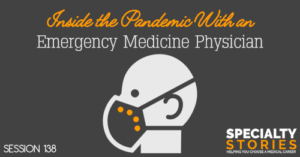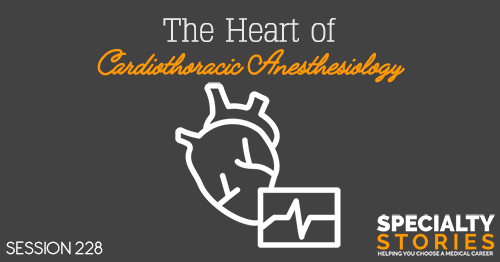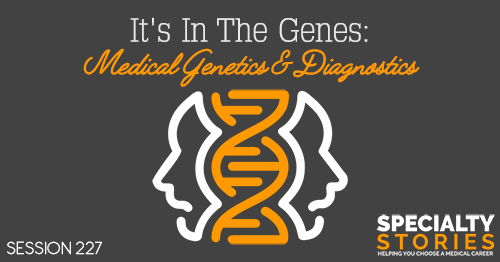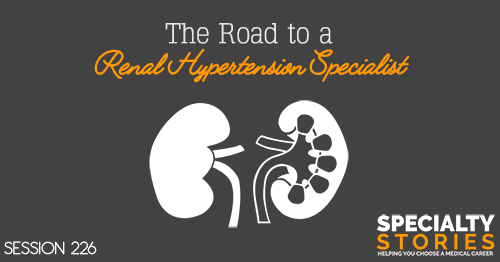Apple Podcasts | Google Podcasts

Session 138
What is it like fighting on the frontlines against the coronavirus in NYC? Dr. Dana Levin, an emergency and aerospace medicine physician, shares his experiences! Dana is in the middle of this pandemic as an emergency medicine physician in New York City. We’re going to have a good discussion.
This will be different from all of our other specialty stories because we’re more focused on the pandemic and his experiences. He’s a prepper for this and his unique experiences leading up to this.
Maybe you can get some knowledge and some encouragement that there are things out there that you can do to prepare for something like this in the future. And one of those things that we talked about is the Wilderness Medicine Program here at the University of Colorado School of Medicine through the Emergency Medicine Department.
Now, Dana is on faculty there. Find out more about Dana on ExplorationMedicine.com. I’m also on faculty there as part of this Emergency Medicine Wilderness Medicine Program. It’s specifically geared towards pre med students. And they do have programs as well for residents for physicians for medical students, so check out those as well.
But if you would like a link to check out the wilderness medicine program, as well as a coupon code, you can text the word to WILDMED to 44222. Meanwhile, check out all our other podcasts on Meded Media.
[02:03] Interest in Emergency Medicine and Aerospace Medicine
Dana’s first interest in it was when he was in middle school building first aid kits and taking them on field trips. But the first time he was really aware of them as a field, he was volunteering as an EMT when he got to college.
The more he did it, the more he enjoyed and found it rewarding. Fast forward to medical school, he went to the Career Planning Office one day and told them that he really wanted to become an astronaut. Then he found out about the Aerospace Medicine Association.
What drew him to it is the curiosity of exploration and the ability to stand on a cooperative platform. It encourages people to pursue really difficult things, and do it in a cooperative way rather than a competitive way.
“You are working as part of a huge team, doing things that are at the very edge of what's possible.”Click To TweetHe isn’t an astronaut now, obviously, But those same things are what drew him to both emergency and aerospace medicine and all the other things that he got himself involved in.
[05:46] The Emergency Medicine Mindset
Mostly because they work in the aerospace medicine field in particular. It is the application of a large amount of disparate teams to solve problems that no one’s ever seen before. Also, part of the field he’s working in is an austere environment. They have limited resources to deal with dramatic problems, which is exactly what we’re facing right now.
“It’s that open mindedness and the team approach that prepare you as well as the austere environment.”Click To TweetIn the aerospace side of things, it teaches a lot of preparatory aspects that are really useful in this time, even though it’s an emergency.
The other thing that’s directly applicable to this situation is their training related to a Masters of Public Health.
When everybody else is frozen or doesn’t know how to handle the situation, they get to have a few tools available and an open mindset that says things are bad. They do what they can with what they have right now to make it incrementally better. And then go from there to make it better again. So you start digging yourself slowly out of this hole. And this is the emergency medicine mindset.
[09:14] The Pandemic in New York City and Being on the Frontlines
Dana says it’s stressful yet encouraging. There’s a lot to be really hopeful about. They have an incredible team.
“People have really rallied behind us and in front of us and around us.“Click To TweetThey’ve got the direct aspect of hospital administration that’s opened up all sorts of new pathways for them. They have aspects of other hospital teams and other services that are coming in to offload their patient load.
They have people outside of the medical field that are designing ventilators or building or printing out PP on their own 3D printers at home.
Dealing with sick patients is stressful. They discharge most people the same as it always has been in the ER, but they are managing critical care patients on top of that.
So they have to play the role of urgent care to some extent primary care as well as inpatient medicine and inpatient Critical Care Medicine. And that gets tiring for a 12-hour shift. But it’s manageable so far. They’re just taking it one day at a time.
[10:32] Are Students Going to Graduate Early?
Dana explains that if he was a med student, he’d be terrified. They will call people. They will check in on people through a telemedicine platform, at least that’s what they’re trying to use them for at Columbia.
They are doing lab follow ups, they are taking on some patient care responsibility. But there’s a lot of on the job training that happens.
So people kind of slot into where they best fit. And some of that patient care is transport. Some of that is follow up and explanations. And some of the most important work that they can do right now is just be reassuring to people and tell them it’s going to be okay. Or give them a realistic picture of what is happening and prepare them for real challenges and real stresses and even when things are not okay.
And that’s something that med students are surprisingly well equipped for. So, he thinks that it’s really useful, and he’d be very interested to see how this plays out now that they’ve at least accepted that some students are capable of graduating early.
[12:06] A Lot of Changing Information and Buying Time for Their Patients
It’s a lot of information to sort through, and on some level, only some of it gets through every time.
“The reality is we don't know the best way to treat this thing yet.”Click To TweetEverybody’s experimenting and when something really does work, it went through everybody like wildfire in a very rapid fashion.
But when you’re dealing with all the other stuff that day to day operations change the potential of different medications that may or may not work. The slew of new studies that are out there, it’s a little bit overwhelming. And it’s kind of helpful to almost tune most of that out and wait for the most beneficial things to float to the top.
In emergency medicine, they don’t need a diagnosis. They tend to approach most patients from what’s happening. “Let me fix the immediate life threats so he can buy time.” And that’s a lot easier to do than necessarily figuring out exactly what’s going wrong.
Internal medicine, in particular, really drills down and understands the diagnosis. So it’s nice to have that team approach where ER figures out how to buy time. Internal Medicine uses that time to figure out what’s going on and come up with a definitive plan. So that nice little meshing is really what’s been helpful.
And they are doing this now on a much broader scale. So the ER groups are handling a very unknown very dynamic situation and buying time for everyone else to do the work they need to do to figure out how to actually fix it.
[14:30] Is It Socialized Medicine?
This is a real struggle that pretty much everywhere in the world has to deal with. So some countries did get this right. They experimented, they tried something. The US tried a different strategy, and we didn’t get it.
“Emergency medicine is not here to answer questions. Aerospace medicine, to an extent, isn't either. We're just here to prepare for the next one using the information we have.”Click To TweetThey learned that if there are other strategies out there that do work, it would have been great to know that ahead of time. And there were probably opportunities where they could have, but they didn’t make that decision.
Dana says that all we can do is go forward from where we are. And as we are learning the realities of this situation, we are starting to improve and get better at how to manage where we are. We learn at the same time as we’re learning the lessons of how to not have this happen again in the future.
[16:32] Hope for Cooperative Efforts in the Future
“We have an entire generation of people right now that are growing up with a very real threat, health, and a very tangible inability to handle.”Click To TweetWe have unprecedented unemployment right now in the US, and most of our insurance was built on an employment-based structure. So we have tons of people that can no longer afford care we already had and a large portion of people that couldn’t.
Dana thinks that what you’re seeing is that states and communities that really have rallied around public health. And even in some cases, public access to care whether that’s through their own funding structures for everyone in the state or their funding structures for people that can’t afford care to show up. Those states are going to have a much better response, they’re going to have a much faster response than the states that don’t. And it really is like that.
We’ve seen this as a slow public health crisis over decades, where there are many people that are much more at risk and other areas have access to care.
Dana thinks you can offload the emergency department just by having people know where to go. Those are going to be the lasting impacts that we’re going to see. And he’s hoping that this will lead to some really productive discussions and some actionable changes in the near term future.
[19:48] The Failure of a Testing System
Dana thinks we have a very discordant ID system right now. We don’t have a central control over this and we don’t have a coordinated response.
This is not even saying anything about political leadership. He even couldn’t say whether using private industry is better than using public manufacturing. But one thing is for sure – we didn’t have that capability.
“Leaning on a public sector that didn't have the capability might not have been the best choice.”Click To TweetIn hindsight, Dana thinks we could have bought existing tests from other countries. We could have leaned on our private side or private sector,. We could have done all three of those and approach it in a kind of patchwork thing, which does have its own challenges.
Each test is different and has different characteristics. But it would have been more widespread. It would have given us an earlier start and potentially a better sense of where this virus was to create targeted containment so that we don’t have to say, we don’t know.
Let’s just isolate everyone. And that would have spared us a lot of heartache. But again, that’s all hindsight. It was failing. It’s something we have identified. Now. It was probably something we could have anticipated.
[22:43] Traits of Becoming a Successful Emergency Medicine Physician
Dana thinks the most important ones are being able to see the positive in every circumstance, being able to remove yourself. Because if you don’t choose when to process them, those feelings will come out in inopportune moments on their own. So you have to have a support network.
“Acknowledge that you have feelings. Acknowledge those feelings exist, and give yourself some time to process them. “Click To TweetBe able to lean on your colleagues and recognize that you need to make snap decisions. You need to be really decisive and capable of making those decisions.
You also have to be open to other suggestions of your team members. Be willing to admit that your approach may not be working and others may be better than yours. Be able to set aside pride, a willingness to be wrong. Be willing to try stuff, even though you may be wrong.
Lastly, acknowledge that stress is real. That your team is experiencing the same stresses as you are. You need to lean on each other and take care of each other. That if you look at one person and they seem like they are totally overwhelmed, tap them out, put a hand on their back. Let them go get something to eat while you handle an extra set of load for a few minutes so that they can come back and be involved in the team again.Don’t wait for people to collapse. You need to do that with yourself too.
[25:16] How to Prepare for This in the Future
Be willing to attempt things that you know that you’re not good at and get used to the feeling of failure.
“Get used to being able to make mistakes and to come back from them.”Click To TweetIn the practical operational world, it tends to just add unnecessary stress. So being willing to make mistakes. Be willing to identify when something isn’t working and try something different.
Recognize when you have space to win when there is a forgiving problem and when there isn’t one. So if you have a little bit of time to make a decision, and you have to choose and you have to accept the outcome. Or when you have more time than it seems, and you can try a few things. And then if that’s not working, try something else.
And you get that by practicing making mistakes, practicing things that you’re not good at learning from others. Seek out ways to interact with people that are not in the same discipline as you so you.
[27:28] Training for Wilderness Medicine
“In wilderness medicine, you're putting yourself in an environment where you don't have the resources you necessarily need to handle everything you're going to see.” Click To TweetThere are two skill sets in wilderness medicine. There’s a preparation skill set. You’re going to try to anticipate everything. You’re going to build a kit. And learning the skill sets and practicing, that is exceedingly valuable. You can really turn a trip that could be a disaster into one that is absolutely uneventful and smooth and completely fun. You can do that by preparing appropriately.
But preparation doesn’t get everything. You can’t predict. You can’t anticipate that. The weather will make sudden changes or that there’s a rock slide or that you’re one of your teammates has to leave at the last minute and now you get somebody else in that has chronic medical conditions in the field.
You have unexpected things happen, and you need to be able to handle those unexpected things.
The more you spend time in environments that are unpredictable or resource-limited, the more comfortable you are working with limited information and improvising your treatments.
When you’re out in the wilderness and you don’t have this stuff. And you need to handle somebody with a broken leg for example. But you have tape and you’ve got sticks, you can make an improvised splint. Now, you have that person’s legs cured. And now you can carry them effectively. You can even build a litter out of just the material that you have like a carrying stretcher out of the materials you have available to you.
So that kind of a mindset in the wilderness is the same mindset that’s applied in the emergency room now on a regular basis.
Dana encourages everybody to do wilderness medicine care if you enjoy being in the wilderness. If you don’t enjoy it, there are other places that you can get that same improvised mindset. But the wilderness medicine programs are one of the best and easiest ways to do that.
[33:04] Final Words of Wisdom
Take a breath, check in with yourself. See what needs care and what doesn’t. Check in with your friends, check in with your family, check in with everybody around you. And when you identify something that needs care, care for it.
If you have brain space for it, learn skills now that you’ve always wanted to. If you have downtime, take that downtime and use it for something productive. If you’re overwhelmed and you don’t have brain space for it, relax, it is very useful to do self care to zone out and spend an entire day watching Netflix if that’s what you want to do.
Those kinds of things really do reset you. They prepare you to be available when the need arises. And being able to recognize when you need care and when you don’t, that’s okay.
“There's no shame in being stressed and anxious right now.”Click To TweetYou want to make sure that while you have time to be stressed and anxious, you’re stressed and anxious. So that when you don’t have time for it, you’ve already taken that self-care and you’re ready.
Links:
SEARCH SITE
LISTEN FOR FREE











